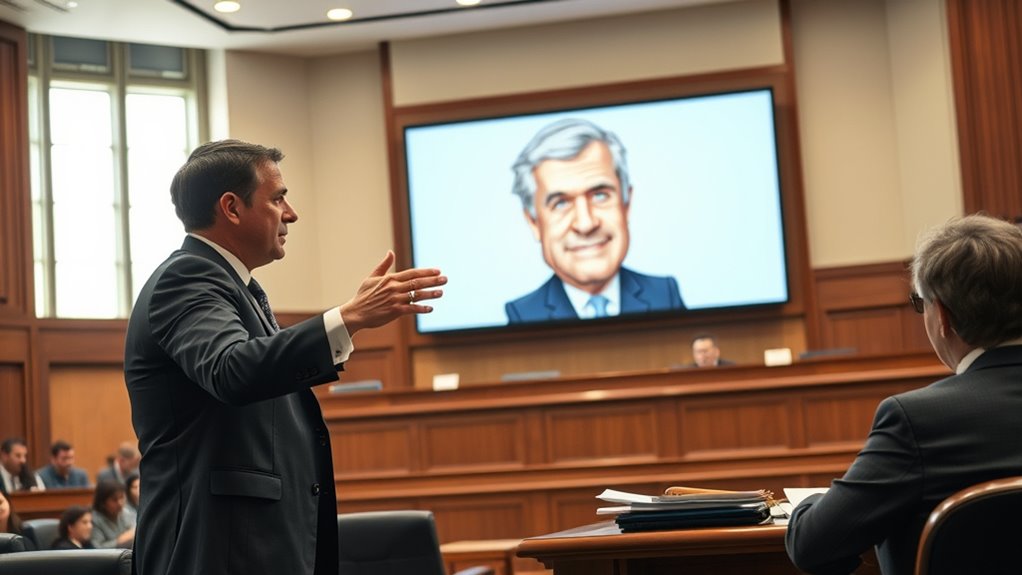A parody defense really applies when your work transforms the original into commentary or satire, adding new meaning or message. You should use only enough of the original to make your point without copying its “heart,” and guarantee your work doesn’t harm the market value of the original. Courts look for a clear, transformative purpose that adds value and distinguishes your parody. Keep exploring to understand how these factors can strengthen your case and protect your work.
Key Takeaways
- The parody must transform the original work into commentary or satire, adding a new message or meaning.
- It should use only necessary portions and avoid copying the “heart” of the original.
- The parody must not substitute for the original, avoiding negative impact on its market value.
- The work should be clearly distinguishable from the original, emphasizing its transformative nature.
- Courts favor parody defenses when it critiques, comments, or adds value beyond mere entertainment.

Have you ever wondered when a parody can serve as a legal defense? It’s a common question, especially for creators who want to critique or make fun of existing works without risking legal trouble. The key lies in understanding how parody intersects with copyright infringement and the rules of fair use analysis. Fundamentally, a parody can sometimes be protected as a fair use, but it depends on specific factors that courts carefully evaluate.
When you create a parody, you’re often reusing substantial parts of the original work, which might normally be seen as copyright infringement. However, courts recognize that not all uses are equal, especially when the purpose is to comment on, criticize, or poke fun at the original. This is where fair use analysis comes into play. To determine if your parody qualifies, courts look at four main factors: the purpose and character of your use, the nature of the copyrighted work, the amount and substantiality of the portion used, and the effect of your use on the market value of the original work.
First, your purpose plays a vital role. If your parody transforms the original work into a commentary or satire, rather than just copying it for entertainment, it’s more likely to be protected. Courts favor uses that add new meaning or message, which is often the case in parody. Second, the nature of the original work matters—using a published work, especially one that’s more creative or expressive, can be riskier than using factual or utilitarian content. Third, the amount of the original you use is important; generally, the less you copy, the better, but even a small amount can be problematic if it’s considered the “heart” of the work.
Finally, the most significant factor is whether your parody affects the market for the original. If your use doesn’t substitute for the original or harm its potential market, your chances of a successful fair use defense improve. Courts will scrutinize whether your parody serves as a commentary that adds value, or if it simply copies for profit or exposure. If it’s the latter, your parody might not qualify as fair use, and you could face copyright infringement claims. Additionally, understanding how fair use is balanced against copyright rights can help creators determine the strength of their parody defense. Recognizing the importance of transformative use can be crucial in establishing a parody’s legal protection. Moreover, ensuring that the parody is clearly distinguishable from the original can further support its transformative nature and legal standing. In this context, organization of content and presentation can also influence how a court perceives the parody’s intent and originality.
Frequently Asked Questions
Can a Parody Defense Apply to Digital Content or Social Media Posts?
You might wonder if a parody defense applies to social media and digital content. Generally, parody can be a defense if your content comments on or critiques the original work, and it’s clearly humorous or satirical. On social media, if your post transforms the original, adding new meaning or social commentary, courts may see it as parody. Just verify it’s recognizable as a parody and doesn’t infringe on rights or mislead viewers.
How Does Intent Influence the Applicability of a Parody Defense?
Did you know that over 60% of copyright disputes involve questions about parody? Your intent clarity is vital—if your goal is to parody, it helps establish the parody criteria. When your intent is clearly to provide commentary or humor, the parody defense is more likely to apply. Clear intent helps differentiate parody from infringement, making your content more protected under copyright law.
Does Copyright Registration Status Affect the Parody Defense?
Your copyright registration status doesn’t directly impact the parody defense’s applicability. Whether the work is registered or not, legal protection still applies, but registration can strengthen your position if legal action occurs. A successful parody defense mainly depends on whether your work comments on or criticizes the original, rather than registration status. So, focus on the nature of your parody and its legal basis, not just registration.
Are There Specific Industries More Likely to Benefit From Parody Defenses?
In industries like the music industry and political satire, parody defenses are more likely to benefit you. These fields often rely on creative expression and social commentary, making courts more receptive to parody claims. If you’re producing content that comments on or critiques original works, especially in music or political satire, you stand a better chance of successfully invoking a parody defense, protecting your work from copyright infringement claims.
How Do International Copyright Laws Impact Parody Defense Applicability?
You might not realize it, but international copyright laws considerably influence when your parody defense applies. As you navigate different countries’ copyright treaties, you’ll find that some nations offer stronger protections for parody under fair use or fair dealing. International enforcement varies, so your parody might be protected in one country but challenged elsewhere. Staying informed on these treaties helps you understand how your parody can qualify for a defense globally.
Conclusion
So, next time you’re thinking about parodying someone’s work, remember, it’s a tightrope walk over a pit of legal chaos. If your parody hits the mark, it could be your shining shield, protecting you like a superhero’s cape. But if you stumble, it’s like falling into a tornado of lawsuits and fines swirling around you. Be careful—because when parody defense applies, it’s your only hope to escape the legal storm unscathed.









